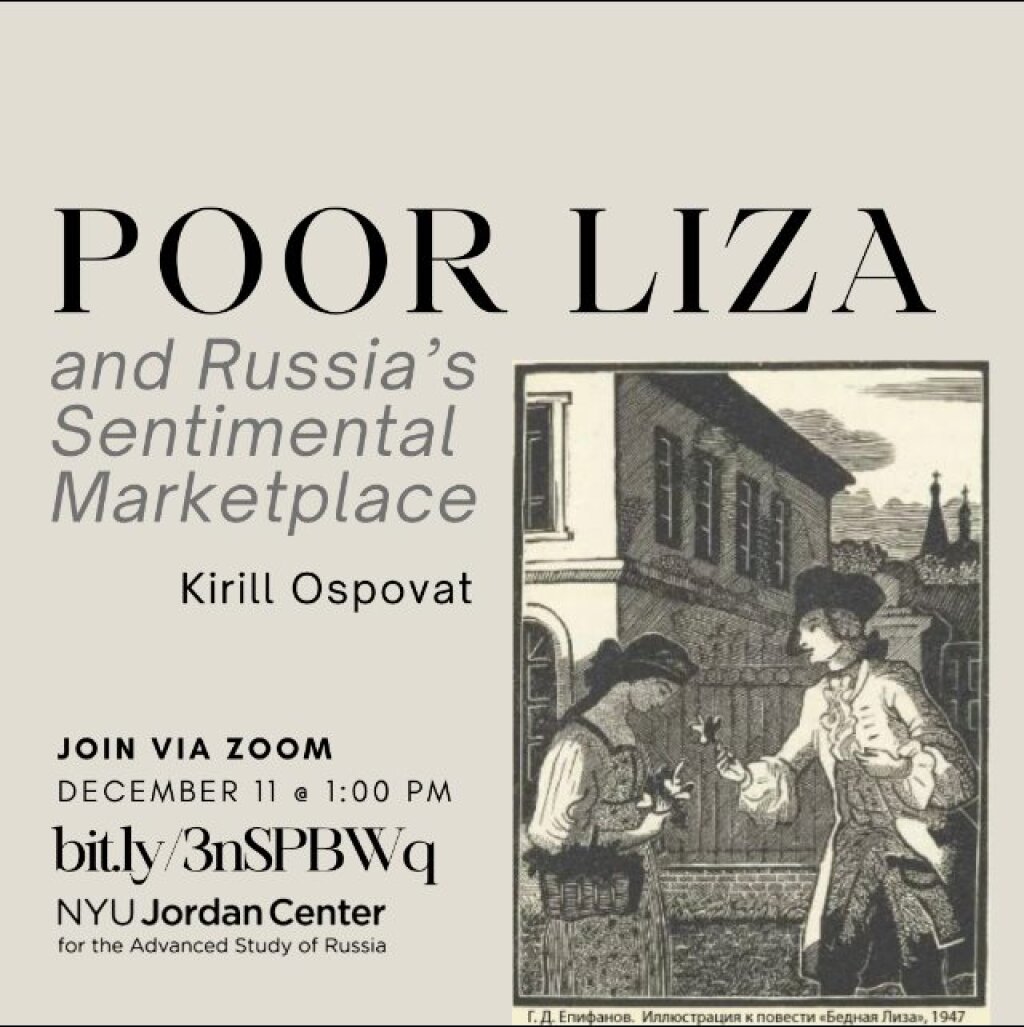On December 11, 2020, the Jordan Center welcomed Prof. Kirill Ospovat for a talk on links between narrative modes and visions of economy that defined Russian sentimentalism. Through a close reading of Karamzin’s classic Poor Liza (1792), Ospovat will illuminate the constructions of “sentimental commerce” which aligned specific modes of subjectivity and spectatorship with visions of the market, debates on luxury, and analysis of poverty. He is an assistant professor at University of Wisconsin-Madison and the author of “Terror and Pity: Aleksandr Sumarokov and the Theater of Power in Elizabethan Russia” (2016) and “Pridvornaia slovesnost’. Institut literatury i konstruktsii absoliutizma v Rossii serediny XVIII veka” (2020). His next book will explore the social aspects of Russian sentimental fiction through close readings of Karamzin, Gogol, and Dostoevsky. The talk was introduced by Ilya Kliger, Associate Professor of Russian & Slavic Studies at New York University.
Professor Ospovat began by asserting the plot and the affective structure of Poor Liza as heavily built upon the economic aspects of the fiction. Citing recent scholarship of Natalya Khokholova and Tatiana Smoliarova, Ospovat linked Poor Liza to pan-European debates on commerce, luxury, and poverty. Redefining sentimentalism as an artistic mode interwoven with concurrent developments in moral social aesthetics and economic theory, Ospovat offered a parallel reading of the novel with Jean-Jacques Rousseau's Discourse on Political Economy (1755) and Adam Smith's Wealth of Nations (1776).
Rousseau described the ongoing socioeconomic devastation of the country by the city, which Ospovat associated with the concurrent commercial redistribution driven by useless luxury consumption of urban elites and the corresponding moral corruption. "This moral and economic constellation underlies the archetypical sentimental plot for Rousseau: 'I look upon any poor man as totally undone if he has the misfortune to have an honest heart, a fine daughter, and a powerful neighbor,'" Ospovat read, also highlighting the presence of a Rousseauian spectator sympathizing with the situation. Having identified the commonplace tension between the anonymous peasant daughter's chastity and the wealthy city dweller, Ospovat reminded us of Terry Eagleton's comment on Samuel Richardson's Clarissa: "sexuality far from being some displacement of class conflict is the very medium in which it is conducted."
Poor Liza, the title of which sheds light on both Liza's misfortunes and the narrator's compassion, similarly tells a sentimental story against an evolving social backdrop. Citing Gitta Hammarberg's seminal work, Ospovat called attention to the buyer-seller relation upon Liza's first encounter with Erastus, further focusing on her economic state of poverty after the death of her bread-winning father. He also compared the narrator of the tale to the archetypical figure of "sentimental interiority", much resembling Rousseau's reveries of the solitary wanderer and societal spectator.
"The spectatorship was appropriate for an idle and enlightened nobleman, [...] a first-person account of a fashionable social practice of strolling in the city's rural environments," said Ospovat. That the spatial image of the canal supplying the city with economic progress is told through the sentimental spectator in the opening of the fiction further echoes Karamzin's own contemplation of the city's capacity for economic absorption as threatening.
Reflecting on the social transition from subsistence farming to hired labor from the market, Ospovat emphasized the text’s idealization of Liza's deceased father as an industrious individual farmer, contrary to the popular portrayal of Russia's serfs deprived of agency in literary representations at the time. Drawing from Adam Smith's admiration for the perfect rural worker in agrarian economy and his critique for the relatively ineffective hired laborers, Ospovat contextualized the narrative of Liza's familial misfortunes in a wider socioeconomic landscape.
On Erastus' mistreatment of Liza, Ospovat brought forth the "social type or class of enlightened urbanites whose moral attributes and aesthetic tastes are not separable from their economic behavior and specifically modes of consumption." Ospovat characterized Erastus' confession, driven by pursuit of luxury and desire for the sublime, as more an economic and moral condition than personal malice. He further commented on the political economy behind the pursuit of pleasure, which has become a way of life for the wealthy urban class.
Citing the social type from Samuel Johnson's The Adventurer, Ospovat observes in Erastus-- and the whole class of wealthy urban men freed from the financial burden of subsistence-- a pattern of desire and an impossibility to find satisfaction. This contributes to his drive towards luxury, and later, Nature and the countryside, and eventually Liza herself.
For the rest of the lecture, Ospovat introduced Adam Smith's division of labor and theory of value and their linkages to Karamzin's fiction. During Q&A, Ospovat supplied more theoretical and literary contexts to answer questions raised about gender, chastity, symbolic value, Liza’s agency, the narrator’s role, reception by readers, Smith’s concept of sympathy, and more.



